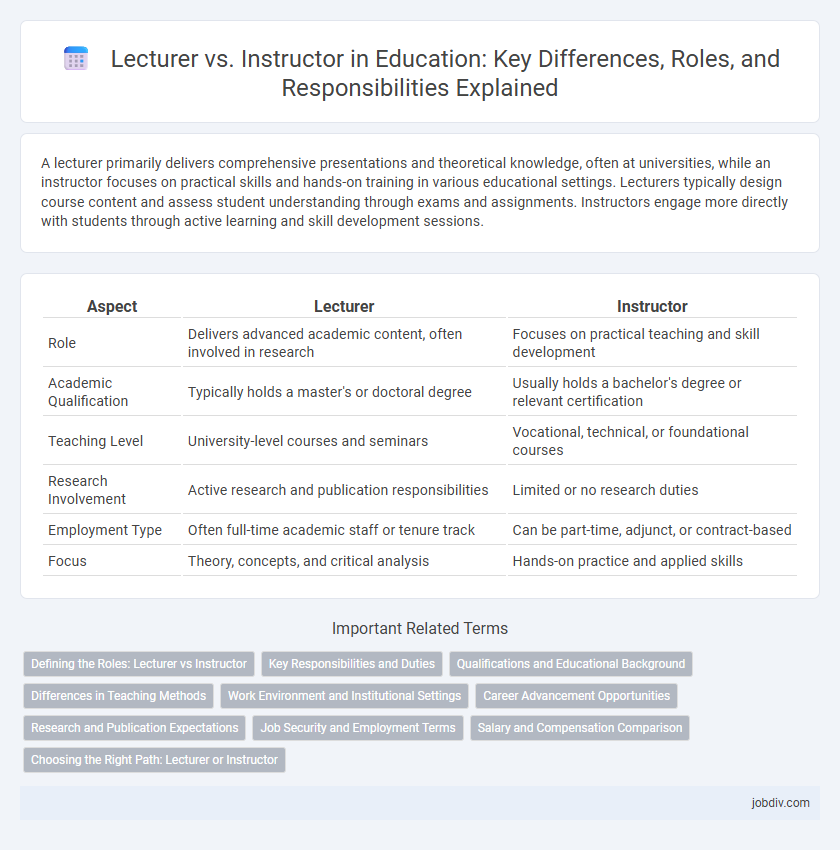A lecturer primarily delivers comprehensive presentations and theoretical knowledge, often at universities, while an instructor focuses on practical skills and hands-on training in various educational settings. Lecturers typically design course content and assess student understanding through exams and assignments. Instructors engage more directly with students through active learning and skill development sessions.
Table of Comparison
| Aspect | Lecturer | Instructor |
|---|---|---|
| Role | Delivers advanced academic content, often involved in research | Focuses on practical teaching and skill development |
| Academic Qualification | Typically holds a master's or doctoral degree | Usually holds a bachelor's degree or relevant certification |
| Teaching Level | University-level courses and seminars | Vocational, technical, or foundational courses |
| Research Involvement | Active research and publication responsibilities | Limited or no research duties |
| Employment Type | Often full-time academic staff or tenure track | Can be part-time, adjunct, or contract-based |
| Focus | Theory, concepts, and critical analysis | Hands-on practice and applied skills |
Defining the Roles: Lecturer vs Instructor
Lecturers primarily deliver structured, in-depth presentations on specialized subjects, often at universities, and typically engage in research and curriculum development. Instructors focus more on hands-on teaching, skill development, and practical application, frequently found in vocational or technical settings. Both roles play crucial parts in education, but their methods and objectives differ significantly.
Key Responsibilities and Duties
Lecturers primarily develop course content, deliver lectures, and conduct academic research to enhance subject knowledge, while instructors focus on practical teaching, student assessments, and skill development through hands-on training. Lecturers often engage in curriculum design and publish scholarly work, whereas instructors facilitate learning by guiding classroom activities and providing personalized feedback. Both roles emphasize student engagement, but lecturers lean towards theory and academic advancement, and instructors prioritize applied learning and competency building.
Qualifications and Educational Background
Lecturers usually hold advanced degrees such as a Master's or PhD and often engage in research within their academic discipline. Instructors may have a bachelor's degree or professional certification and focus primarily on teaching practical skills or foundational knowledge. The educational background of lecturers tends to emphasize theoretical expertise, whereas instructors emphasize applied training and hands-on experience.
Differences in Teaching Methods
Lecturers primarily deliver content through formal presentations and lectures, emphasizing theoretical knowledge and broad subject overviews, often in large classroom settings. Instructors tend to engage students with interactive teaching methods such as discussions, hands-on activities, and personalized feedback to enhance practical skills and application of concepts. The key difference lies in lecturers focusing on information dissemination while instructors prioritize active learning and student participation.
Work Environment and Institutional Settings
Lecturers typically work in universities and colleges, where they focus on delivering theoretical knowledge and often engage in research alongside teaching. Instructors are commonly found in vocational schools, community colleges, and training centers, emphasizing practical skills and hands-on learning in more applied or technical disciplines. The work environment for lecturers tends to be academically oriented with opportunities for publishing and attending conferences, while instructors operate in settings prioritizing direct student interaction and skills development.
Career Advancement Opportunities
Lecturers often access broader career advancement opportunities through research involvement and publication requirements, whereas instructors typically advance by enhancing teaching credentials and gaining specialized certifications. Universities favor lecturers for tenure-track positions and academic leadership roles due to their emphasis on scholarly contribution. Instructors may progress to senior teaching roles or curriculum development specialists, reflecting institutions' distinct pathways for career growth.
Research and Publication Expectations
Lecturers are often expected to engage actively in research and contribute to academic publications, enhancing the institution's scholarly reputation. Instructors typically focus more on teaching responsibilities with limited or no research obligations, allowing them to concentrate on curriculum delivery and student engagement. The disparity in research expectations influences contract terms, career progression, and overall academic workload within higher education.
Job Security and Employment Terms
Lecturers often have greater job security due to longer-term contracts or tenure-track positions compared to instructors, who typically work on short-term or part-time contracts. Employment terms for lecturers usually include benefits such as health insurance, retirement plans, and professional development, while instructors may face limited access to these perks. Institutions prioritize lecturers for full-time roles, contributing to more stable and predictable career paths within academia.
Salary and Compensation Comparison
Lecturers typically earn higher salaries than instructors due to their advanced qualifications and research responsibilities, with average annual earnings ranging from $60,000 to $80,000 compared to instructors' $45,000 to $60,000. Compensation packages for lecturers often include benefits such as research grants, sabbaticals, and faculty development funds, while instructors generally receive more limited benefits focused on teaching duties. Salary differences reflect institutional priorities, with lecturers positioned as senior academic staff and instructors often employed on a contract or part-time basis.
Choosing the Right Path: Lecturer or Instructor
Choosing between a lecturer and an instructor role hinges on career goals and teaching style preferences. Lecturers often emphasize research and delivering comprehensive university-level courses, while instructors focus on skill development and practical training in specialized subjects. Evaluating the balance between theoretical knowledge and hands-on experience helps determine the ideal educational path.
Lecturer vs Instructor Infographic

 jobdiv.com
jobdiv.com